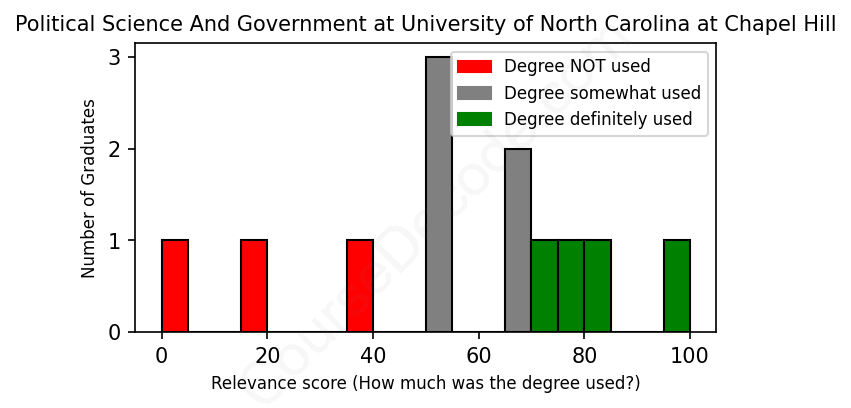
First, some facts. Of the Political Science And Government graduates from University of North Carolina at Chapel Hill we've analyzed , here's how many have used (or NOT used) their degree in their career:

These are estimates based on AI analysis of 12 LinkedIn profiles (see below).
The verdict? Significantly below average. Overall, with an average relevance score of 55%, Political Science And Government graduates from University of North Carolina at Chapel Hill have a much lower likelihood (-12%) of finding work in this field compared to the average graduate across all fields:
And for comparison, here's the chart for all profiles we've looked at across all degrees.
Also, after graduating, 41% of these graduates have pursued further education other than another Bachelor's degree (such as a Masters degree or other), compared to the average across all profiles of 35%. This suggests you may need more than just a Bachelors degree to be competitive as a Political Science And Government graduate.
See the details:
|
Relevance score: 50% We think this person has gone into a career only somewhat relevant to their degree. We think this person has gone into a career only somewhat relevant to their degree.
DEGREE INFOGraduated in 2023 from University of North Carolina at Chapel Hill with a Bachelor of Arts - BA in Political Science And Government. No other secondary education since. JOB HISTORY SINCE GRADUATIONAdministrative Assistant/Service Manager Southeast Security & Fire Protection, LLC Jan 2023 - Present ABOUTI am a University of North Carolina at Chapel Hill alumni as of May 2023. I received a Bachelor's Degree in Political Science with a Philosophy, Politics, & Economics and Social & Economic Justice double minor. |
The top 10 most common jobs done by the graduates we've analyzed (ranked most common to least) are:
After looking through the job history of people who graduated in Political Science and Government from the University of North Carolina at Chapel Hill, it's clear that they tend to explore a mix of roles. Many have taken on positions like Program Assistants, Administrative Assistants, and various nonprofit roles, such as Coordinators and Managers. A few have landed more directly relevant roles in political settings—like serving as a Council Member or working in government policy—but these instances are less frequent. For the most part, it seems that graduates have ended up in roles that don't fully utilize their political science background, focusing instead on administrative tasks or areas only tangentially related to politics, such as data analysis or community development management.
Overall, while there are certainly notable exceptions—like those directly engaged in policy-making and political advocacy—many graduates have found themselves in jobs where their political science degrees are not the main focus. Instead, they're often applying more general skills like management, administration, and data handling, which, while valuable, don't directly relate to the core studies of political science and government. So, if you're thinking about pursuing a degree in this field, keep in mind that while some pathways can lead directly to political careers, others might take you in different directions that don’t always align with what you learned in school.
Here is a visual representation of the most common words in job titles for Political Science And Government graduates (this is across all Political Science And Government graduates we've analyzed, not just those who went to University of North Carolina at Chapel Hill):

So, when you look at the career paths of Political Science and Government graduates from the University of North Carolina at Chapel Hill, it seems like a lot of people start off in roles related to administration, assistance, or internships right after they graduate. For many, their first jobs include positions as administrative assistants or program assistants, often in nonprofit organizations, government agencies, or educational institutions. It looks like they’re getting their feet wet in the field and gaining some practical experience, which is super important. Over the years, many have moved up the ladder into more specialized roles or management positions, particularly in nonprofit organizations or government oversight roles, which make sense given their background in political science.
Fast forward 5 to 10 years later, a good number of these graduates have found their footing in careers quite relevant to their degrees. They’ve taken on roles like program directors, policy analysts, and even leadership positions within influential organizations. A few have even made their way into legal careers, which is another common direction for political science majors. However, there are also some grads who have ended up in roles that don't scream political science, like sales and management positions at corporations, which might not align perfectly with their degree but ultimately can provide valuable skills and experiences. Overall, while it’s clear many have landed in meaningful jobs tied to their major, some have strayed into areas that are a bit off the beaten path. It’s a mixed bag, but definitely not unsuccessful!”
Getting a Bachelor's degree in Political Science and Government at UNC Chapel Hill can be pretty challenging, but not ridiculously so—it's about average compared to other majors. You'll dive into a lot of reading, writing, and critical thinking, which means you'll probably spend your fair share of late nights working on essays and group projects. Plus, classes can get pretty intense when you discuss current events and theories, but if you're passionate about politics and good at keeping up with news, it can feel more like engaging than grueling. Overall, it's a solid mix of difficulty and interest, so if you're really into the subject, you might find it both stimulating and manageable!
Most commonly, in the LinkedIn profiles we've looked at, it takes people 4 years to finish a Bachelor degree in Political Science And Government.
Looking at the career paths of these UNC Chapel Hill grads, it seems like they've mostly landed decent jobs, but the pay scale likely varies quite a bit. For instance, those working in government or non-profits like the American Cancer Society and various policy roles might be making a solid income, especially if they've risen to management positions, although non-profits can sometimes lag behind corporate pay. Meanwhile, others, like the recent graduates just starting out, may still be grinding away in administrative or entry-level roles, which usually don’t pay as much. Overall, it seems some of them are definitely making more than a typical college job, but it might take time for the younger ones to hit their financial stride. So, it's not all rainbows and dollar signs, but there's potential for growth!
Here is a visual representation of the most common words seen in the "about" section of LinkedIn profiles who have a Bachelor degree in Political Science And Government (this is across all Political Science And Government graduates we've analyzed, not just those who went to University of North Carolina at Chapel Hill). This may or may not be useful:

Here are all colleges offering a Bachelor degree in Political Science And Government (ordered by the average relevance score of their Political Science And Government graduates, best to worst) where we have analyzed at least 10 of their graduates: